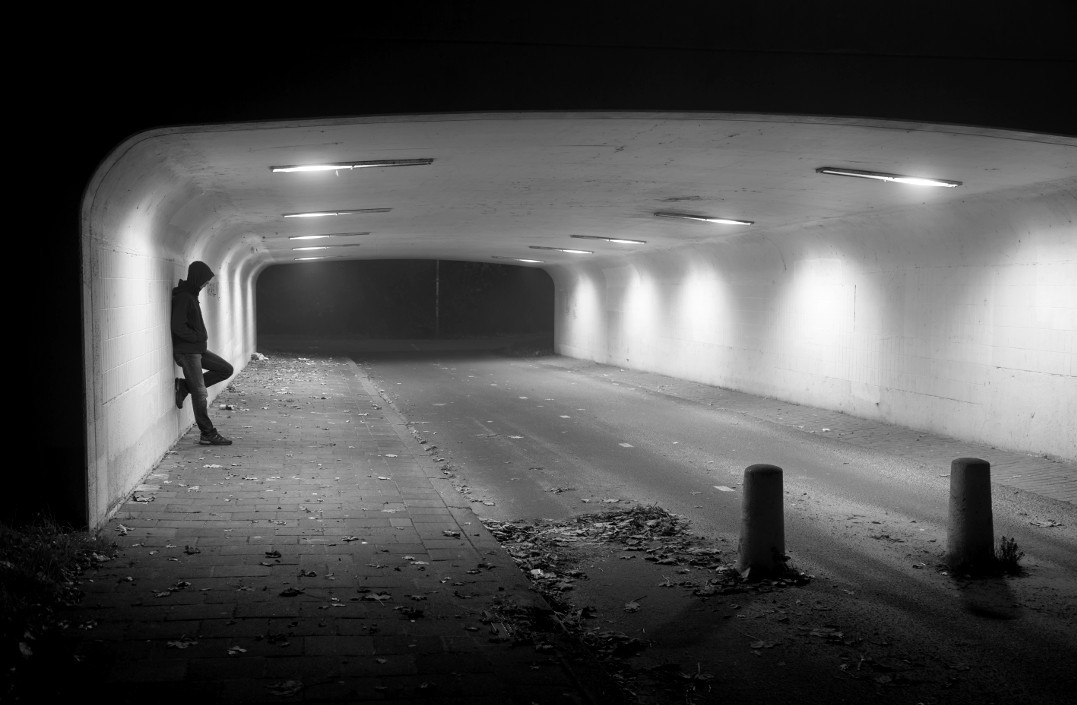Doing the Right Thing

Max looked down at his feet. Gazed back up at the desolate street. Watched as his breath plumed before him in the cold midnight air like dragon’s breath.
He waited.
How had he gotten to this point? He took hold of who he was, and like a string he tried to follow it back through time. But that string was so tangled and twisted that he found he wasn’t able to follow it very far.
His father had introduced him to this lifestyle when he was a child, but that was no excuse. He’d had plenty of opportunities to escape. So why hadn’t he run off when he’d had the chance?
A shadow caught his eye, and he turned in its direction just in time for the darkness before him to melt, morph, coalesce into the figure of another man. The figure dropped a cigarette to the ground, tamped it beneath the heel of a thick leather boot and tipped a broad fedora hat in Max’s direction.
“Evening,” said the man, and oddly Max was reminded of John Wayne. He reached out with a thick muscular hand. Max took it and shook.
“Evening,” echoed Max. Butterflies churned in his stomach. This was it. This was when it would all go to Hell.
“The boss has another job for you,” said the man, reaching in his pocket for a second cigarette. “A gentleman by the name of Richardson. Says he’ll pay quite a sum if you can do this one right.” A stainless steel lighter sparked, ignited. The man lit up and took a long drag. “Sounds important.”
Max shifted his feet, shivered as the frigid air pressed in around him.
Richardson. Max wondered how he’d crossed the boss’s path, and he could only speculate on how terribly he’d fucked up to warrant the boss’s intervention.
Max would be asked to introduce himself, to befriend him, to gain his trust so that he could ultimately lure him to his demise. It was a skill he was good at, a skill that ran in his family, the ability to read minds, to get at the heart of a person’s needs and desires. That, along with a pinch of charisma, won them over every time.
No doubt Richardson would be dethroned. That was the boss’s term. It meant he would be stripped of everything but his life, imprisoned just outside the range of human perception, forced to look on from the shadows in despair as someone else stole his identity, his life, and enjoyed all the things that were rightfully his. He would be doomed to wander the Earth in exile forever.
Like a disinherited prince, the boss was wont to say, hence the term.
But Max wanted no part of it, not anymore. He’d ruined too many lives, had betrayed too many people’s trust, consigning them to a fate worse than death. He’d foolishly followed in his father’s footsteps, but he would follow no further.
“Actually,” said Max in a strangely quiet voice, “I wanted to talk to you about that.”
The man squinted. “Yeah?”
“Well, I—” What was he doing? The boss would tear him apart. Perhaps he too would be dethroned. Well, it would be a fitting punishment, atonement for his own crimes.
“Go on,” said the man.
“I mean, it’s just that— I thought maybe I’d go to school, try to make a different kind of life for myself.”
The man stared at him, boring a hole through Max’s skull. Then without warning he threw back his head and laughed, a hearty mirth that took Max aback.
“School? You’re a funny guy, Max. A very funny guy.”
“I’m serious. I—”
“Stop,” said the man, and just like that the laughter was gone. “You’ll want to stop joking, because sometimes,” said the man, backing Max into a brick wall, “jokes have consequences.”
Max swallowed. He’d prepared for this moment, had practiced what he would say in front of a mirror for hours. But now that he was here and actually saying it, the imagined bluster and bravado had evaporated.
“I can’t,” Max stammered. “Not anymore. It’s too much.”
“The boss gave you everything. And your father. And your grandfather.”
“I appreciate everything the boss—”
“Bullshit,” said the man, poking him hard in the chest, “I don’t think you do. The boss needs you, Max. Your family has a rare skill that he needs, and in return there’s nothing he wouldn’t do for you. And now you’re going to deny him. Why, because it’s hard? Because it hurts? Because suddenly your conscience bothers you and you want to sleep better at night?”
“This is wrong,” said Max, slowly picking up steam. He’d already pushed too far; his fate had been sealed the moment he opened his mouth. “You know it is. I can’t undo what my family’s done, but I don’t have to be a part of it anymore.”
The man glared at him, goggling as if Max had just proclaimed with religious zeal that the Earth was flat. Finally, after a long silence: “So, that’s it then?”
“Yes,” said Max, and he shrugged. “I have to do the right thing.”
“All right.” The man released Max, and he slid down onto the sidewalk, his legs suddenly too weak to support his weight. “You’ll be hearing from the boss soon.” The man stepped back, melted once more into the shadows. “Real soon.”
Once again, Max waited.
Enter your email address and click "Submit" to subscribe and receive The Sign.
